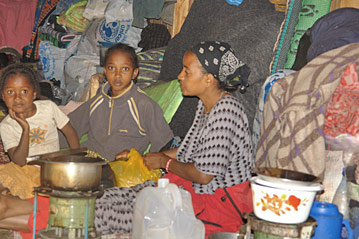UNHCR prepares to evacuate 300 urban refugees from Nairobi
UNHCR prepares to evacuate 300 urban refugees from Nairobi

NAIROBI, Kenya, January 22 (UNHCR) - The UN refugee agency was on Tuesday finalizing preparations to send to safety more than 300 refugees who have been forced to flee from their homes in Nairobi by post-election violence.
The urban refugees - mainly from Ethiopia, the Democratic Republic of the Congo and Burundi - have joined some 1,200 internally displaced Kenyans who have been sheltering in Jamhuri Park, a fairground in the Kenyan capital.
A first group of 150 refugees will be taken Friday - security conditions permitting - on the long journey to Kakuma refugee camp in north-west Kenya, while the rest will be moved next week and alternative accommodation will be arranged in Nairobi until they leave.
The government earlier this week gave notice that Jamhuri Park would be closed as a site for internally displaced people (IDPs) on Wednesday.
Officials say some 600 people have been killed and 250,000 displaced by the violence that has engulfed many parts of the country since the December 30 presidential poll. In Nairobi, an estimated 12,000 Kenyans are living in churches, police stations and other public buildings after being driven out of their homes.
On Monday, UNHCR drew up lists of refugees who wished to transfer from Jamhuri Park to Kakuma, which is located in an area untouched by the violence in the west and around Nairobi. Nearly half of those who presented themselves are registered as refugees with UNHCR. Among the others are people who were awaiting appointments with UNHCR to lodge their claims for asylum.
Most of these people came from the sprawling Kibera slum and the densely populated areas of Kariobangi and Huruma in eastern Nairobi. Many refugees told UNHCR they had been threatened in their home neighbourhoods, while some said their dwellings had been burnt.
"When violence broke out in Huruma estate, the tea house I had set up was torched by marauding youths," said a 32-year-old Ethiopian, who fled to Kenya in 2005 to escape conflict in the south of her country. "When I went to my house, someone else had occupied it. I was told: 'We do not want foreigners here,'" added the mother of five.
She said she had decided to move to Kakuma because she thought it would be safer there. The UNHCR-run camp in the north-west houses some 60,000 refugees, mostly from South Sudan.
"More than 75 percent of the [urban] refugees we have interviewed so far are willing to go to the camps," said Noel Calhoun, a UNHCR social worker. "This says something about the level of trauma the refugees have experienced because we usually face a lot of resistance when we advise refugees to go to the camps."
Another Ethiopian refugee at Jamhuri Park said he was bemused that "the country which saved our lives has turned violent." He said his house was burned down and he sought shelter in a mosque before "UNHCR brought me here."
UNHCR is hiring buses to take the 150 refugees on the two-day journey to Kakuma, which is located near the Kenya-Sudan border some 960 kilometres north of Nairobi. The remaining group will be moved next week, but Calhoun said the movement of the refugees "depends on the security situation between [the western towns of] Nakuru and Eldoret." A police escort may be needed.
Over the last two weeks, sections of the road between Nakuru and Eldoret have been barricaded by local people protesting the contested polls.
Meanwhile, UNHCR continues to support efforts to aid IDPs in Kenya. Over the next two days, the refugee agency expects to transport 530 lightweight family tents to Nakuru for distribution, through the Kenya Red Cross Society, in some of the most affected areas.
On Monday, UNHCR supplied more than 400 family kits to the Red Cross for distribution in Jamhuri Park. A further 5,000 kits have been pre-positioned in UNHCR's Nairobi warehouse ready for distribution. Each kit contains plastic sheeting for shelter, blankets, jerry cans, mosquito nets, sanitary supplies and kitchen sets.
UNHCR also plans to send two computers this week to Kitale and Eldoret to help local officials with data management. A UNHCR expert in site planning is expected to travel to Nakuru to help the government and the Red Cross prepare shelter for IDPs.
By Millicent Mutuli and Emmanuel Nyabera in Nairobi, Kenya








